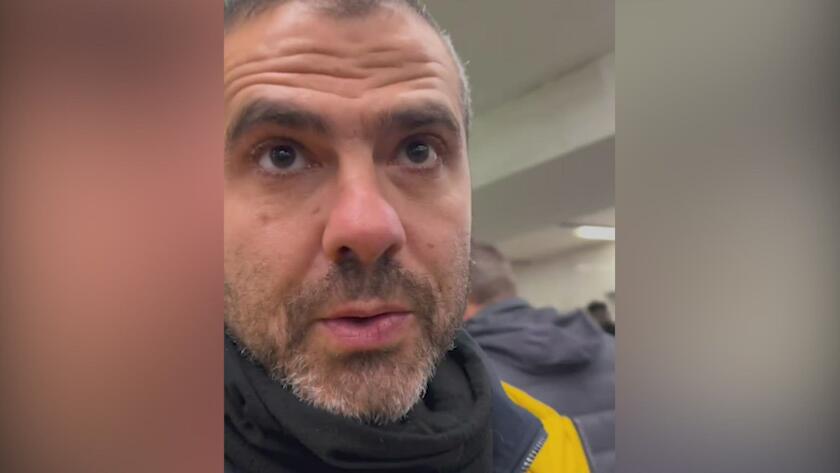Russia pressed ahead with its assault on neighboring Ukraine on Thursday, with explosions resounding in cities across the country, airstrikes crippling its defenses and reports of troops crossing the border by land and sea.
Map: Tracking the invasion of Ukraine | How to help: California organizations supporting Ukraine | What our foreign correspondents are seeing in Ukraine | Photos: Invasion of Ukraine begins
- Share via
Russia widens its attack on Ukraine: ‘We now have war in Europe’
KHARKIV, Ukraine — Moscow accelerated its assault on neighboring Ukraine on Thursday, with explosions resounding in cities across the country, airstrikes crippling defenses and reports of troops crossing borders by land and sea as Russian forces pressed closer to the Ukrainian capital, Kyiv, and citizens fled on clogged highways and took cover in subway stations.
It was uncertain how long the Ukrainian army could hold back a blistering onslaught by Russian forces that included missiles, heavy artillery and cyberattacks. But with brisk Russian advances from the south, north and east, it appeared Russian President Vladimir Putin had his sights set on not just on taking eastern Ukraine but also on conquering a former Soviet republic turned U.S. ally and perceived threat to Moscow.
“We now have war in Europe on a scale and of a type we thought belonged to history,” NATO Secretary-General Jens Stoltenberg said Thursday, describing the incursion as “a deliberate, coldblooded and long-planned invasion” and a “blatant violation of international law.”
The Russian invasion — with an estimated 190,000 troops massed around Ukraine — targeted strategic military sites and swept much of the nation.
- Share via
As Russia unleashes war in Ukraine, world leaders condemn attack
LONDON — As explosions battered Ukraine on Thursday, leaders from across the globe decried Russian President Vladimir Putin’s decision to launch an unprovoked military invasion on a continent that many believed had long ago shaken off the scourge of war.
In Colombia, President Ivan Duque called the invasion “a threat to world peace.”
In Germany, Chancellor Olaf Scholz condemned the attack as an attempt to redraw Europe’s borders and “wipe an entire country off the world map.”
And in Britain, Prime Minister Boris Johnson called on other nations to come to the aid of a “country that for decades has enjoyed freedom and democracy and the right to choose its own destiny.”
- Share via
Biden holds classified briefing with top leaders of House and Senate
WASHINGTON - Amid Russia’s invasion of Ukraine, President Biden held a classified briefing with top congressional leaders today, Senate Minority Leader Mitch McConnell (R-Ky.) said at a public event in Kentucky.
McConnell said he wouldn’t disclose the details of the meeting that also included House Speaker Nancy Pelosi (D-San Francisco), House Minority Leader Kevin McCarthy (R-Bakersfield) and Senate Majority Leader Charles E. Schumer (D-N.Y.).
But the Republican said his advice to Biden was: “Ratchet the sanctions all the way up, all the way up, as far as you can.” McConnell also called for the U.S. to provide “tools” and “weapons” to the Ukrainians.
McConnell said Putin would not be in Ukraine if the U.S. hadn’t left Afghanistan in August. “It was a message to the two big tyrants in the world, Putin and [Chinese President] Xi, that America was losing interest in playing a major role on the world stage.”
- Share via
White House defends sanctions, said the pain to Russia will grow over time
The latest set of U.S. sanctions against Russia over its invasion of Ukraine will increase in cost to Moscow over time, White House officials said Thursday evening. The measures target Russian banks and elites, but do not disrupt global energy markets, they said.
“These are the most impactful and significant sanctions the U.S. has ever taken. These are costs that build over time,” deputy national security advisor Daleep Singh said at a White House press briefing.
“Already we’re seeing the effects of these measures,” he said, adding that the Russian stock market saw a 30% plunge earlier today. “Today was a demonstration that we mean what we say.”
Some have questioned whether President Biden was effectively conceding Ukraine to Russia, particularly after his comment Thursday afternoon saying of sanctions: “Let’s have a conversation in another month or so to see if they’re working.”
White House Press Secretary Jen Psaki emphasized that nothing about his strategy “suggests he is conceding anything.”
“As we’ve conveyed, [the sanctions] are meant to have a squeeze over the course of time, but we’re already seeing an impact on the financial markets, on the currency, on inflation in Russia,” Psaki said. The Biden administration is in conversations with Congress about providing aid to Ukraine, she said.
Psaki said the U.S. is open to accepting Ukrainian refugees, but officials “expect most, if not the majority, will want to go to Europe and neighboring countries.”
- Share via
Ban on tech exports to Russia could cripple Russian military in time, U.S. officials say
Russia’s economy will suffer “extreme harm” as a result of Putin’s decision to invade Ukraine, senior officials from the U.S. Department of Treasury and Department of Commerce said Thursday.
Sanctions announced Thursday on the export of certain technologies and software to Russia could interfere with the Russian military’s ability to function within months, senior officials from the Department of Treasury and Department of Commerce told reporters Thursday.
The sanctions, levied by the U.S. and other countries, restrict the export of items such as semiconductors, microelectronics, navigation equipment, and aircraft parts, as well as their components. They also restrict the secondhand sale of those technologies to Russia.
The officials said that countries such as China, which did not join the sanction effort, will not be able to provide enough technology to meet Russia’s needs.
“China alone can’t supply all of Russia’s critical needs for the military, and it certainly can’t compensate Russia for everything that we’re essentially restricting through these rules, especially as it relates to production of semiconductors,” the officials said.
Aware that Russian elites were moving their money to U.S.-based family members, the officials said they were also aggressively targeting those relatives as well. “Our goal is that we freeze those assets; we take those assets; we starve them of their assets,” one official said, “because by doing that, we starve Putin of those resources.”
- Share via
U.S. lawmakers on Russia sanctions: praise or a push for more, including targeting Putin directly
U.S. lawmakers offered mixed responses to President Biden’s latest announcement of sanctions against Russia over its invasion of Ukraine.
While Democrats largely praised the president and many Republicans criticized the way he handled Moscow’s aggression, both parties condemned Russian President Vladimir Putin.
And there were bipartisan calls for Biden to go further in punishing Russia — including sanctioning Putin himself — and for Congress to come together to provide humanitarian aid for Ukraine.
House Speaker Nancy Pelosi (D-San Francisco) described the newest sanctions as “sweeping and catastrophic,” noting that the president “has made clear throughout Russia’s escalation that we will continue to impose costs on Russia that will leave it weakened in every way.”
Senate Minority Leader Mitch McConnell (R-Ky.), however, argued that “deterrence after the fact is not deterrence at all.”
“The president should have exercised his extensive authorities to impose certain tough sanctions early enough to actually deter invasion and weaken Russia,” he said.
And in a sign that Biden’s sanctions fell short among Republicans, the Senate GOP leader said, “Congress would support truly devastating sanctions against the Kremlin and its enablers.”
Rep. Doug LaMalfa (R-Richvale), a rank-and-file member of the House Republican Conference, said Biden’s earlier sanctions weren’t strong enough to stop Putin from invading Ukraine.
“I support the sanctions announced today but wish they had been imposed as soon as skirmishes started days ago,” he said. “I don’t believe we have months to wait to see if these sanctions work. Along with our allies we should pursue every possible sanction available now, not later, including directly sanctioning Putin himself, pulling the dollar out of all Russian banks, and crippling the oligarchs that control Russia and their military leadership.”
Some Democratic lawmakers, including California Reps. Adam B. Schiff of Burbank and Jackie Speier of Hillsborough, also said Putin should be targeted and Russia blocked from the global financial messaging network known as SWIFT.
“I think the package of sanctions that the president announced is the most severe that we’ve ever levied against Russia,” Schiff, who chairs the House Permanent Select Committee on Intelligence, said on MSNBC.
“Nevertheless, I favor going further. I favor expelling them from SWIFT. I favor imposing sanctions directly on Vladimir Putin. This is an unprecedented situation, and even though we don’t generally sanction heads of state, on occasion we do, and I think it’s merited here.”
Sens. Lindsey Graham (R-S.C.) and Christopher S. Murphy (D-Conn.) also signaled that the chamber would work on a bipartisan aid package for Ukraine.
“Innocent civilians always pay the steepest price in war, and we must spare no expense in appropriating emergency humanitarian aid to support the Ukrainian people in the face of a potential humanitarian catastrophe,” Murphy said in a statement.
- Share via
State Department pulls last U.S. diplomats from Ukraine
WASHINGTON - The last group of U.S. diplomats working in Ukraine has been ordered by the State Department to leave the country and work from neighboring Poland.
Most U.S. Embassy personnel and families had already departed Ukraine, leaving a core group of diplomats who transferred from Kyiv, the capital, to Lviv, a city in western Ukraine that was considered safer.
Early this week, the diplomats began commuting – working by day in Lviv and spending their nights in Poland. But on Wednesday night, as Russia was launching its invasion of Ukraine, the group was instructed not to return to Lviv but work from Poland.
- Share via
What our correspondents are seeing in Ukraine
In Kharkiv, Ukraine, Times photojournalist Marcus Yam captures scenes from an underground train station also serving as a shelter, where hundreds of people have fled as Russian invades.
See more coverage from our correspondents>>
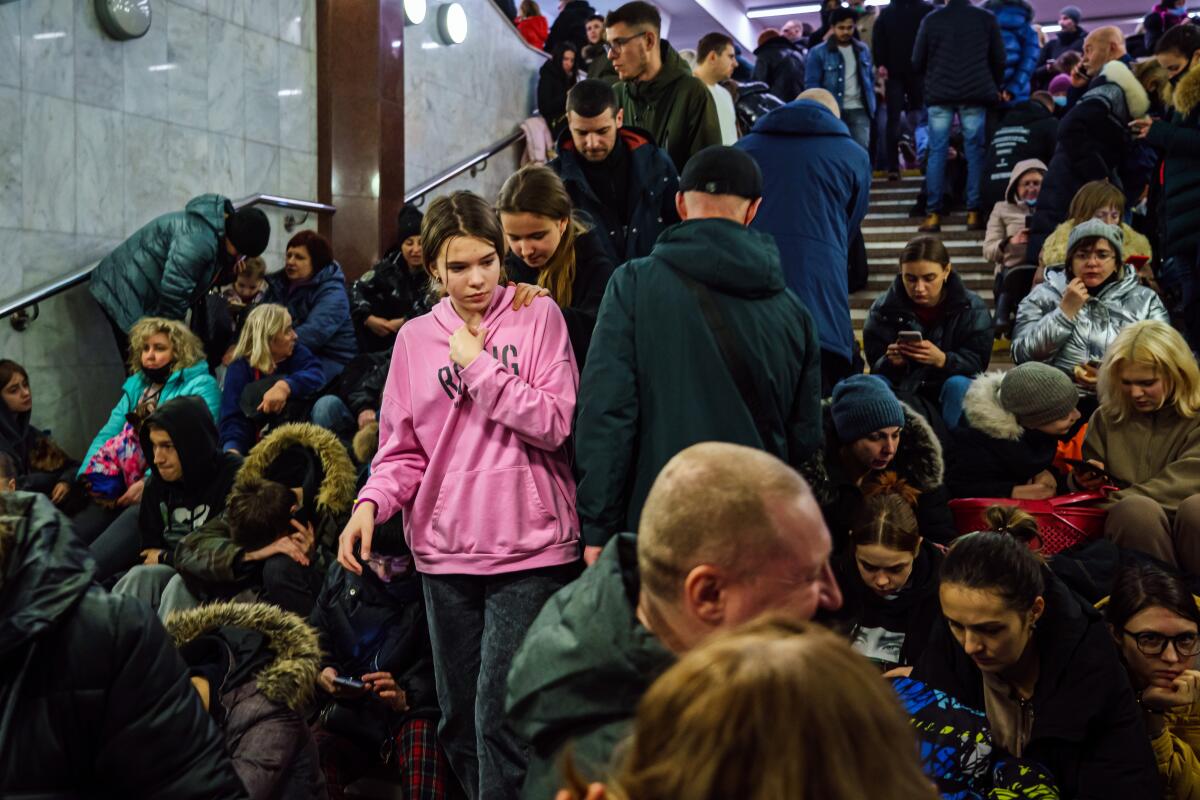
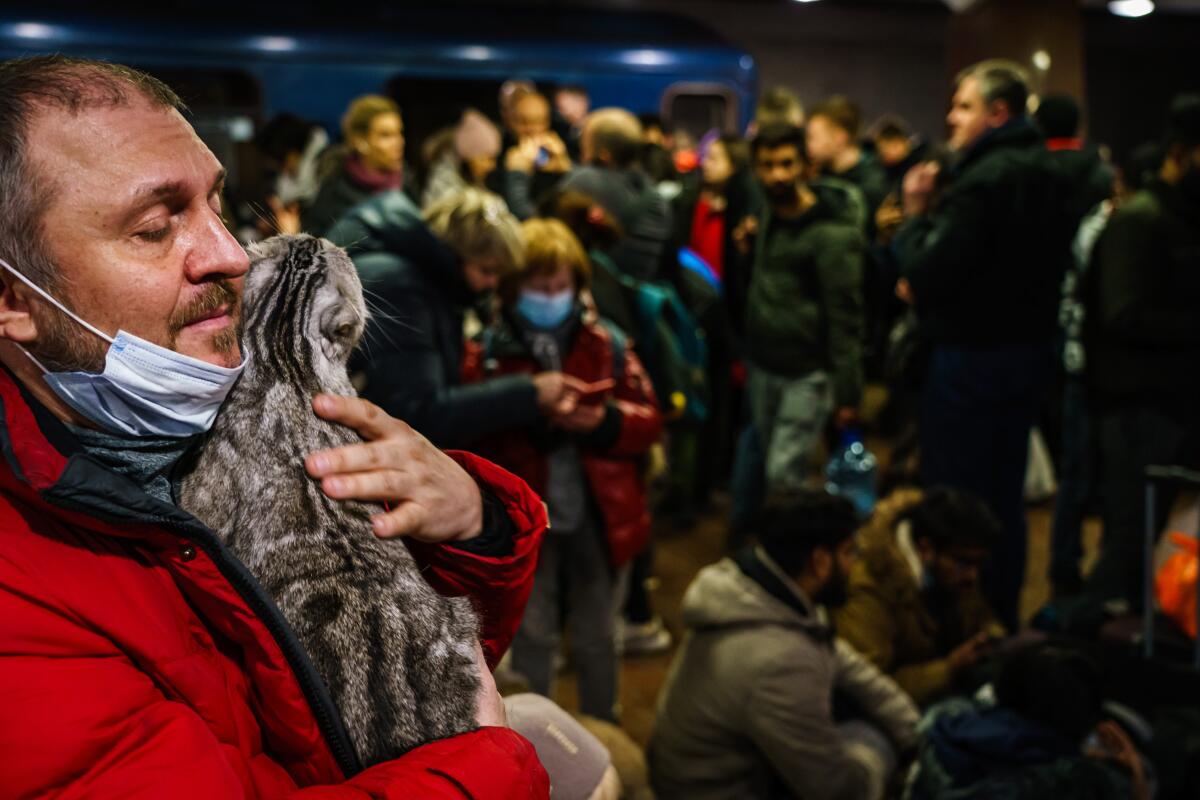
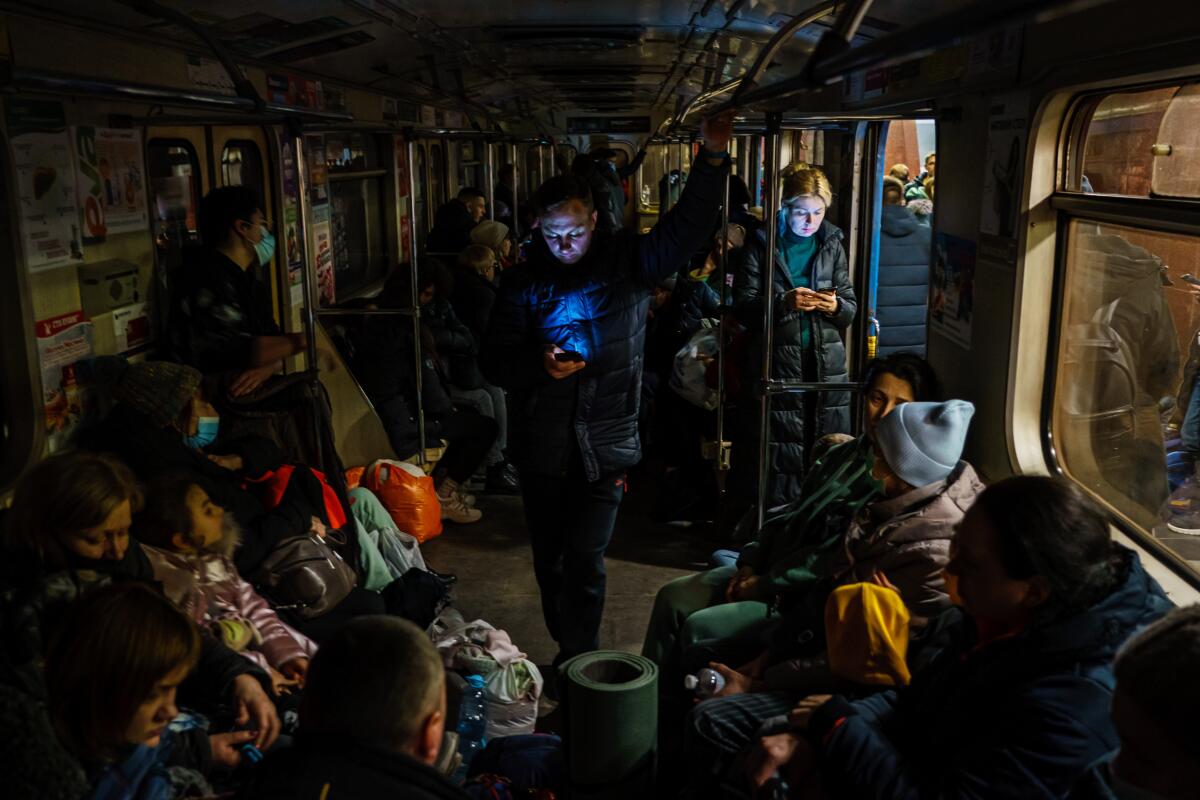
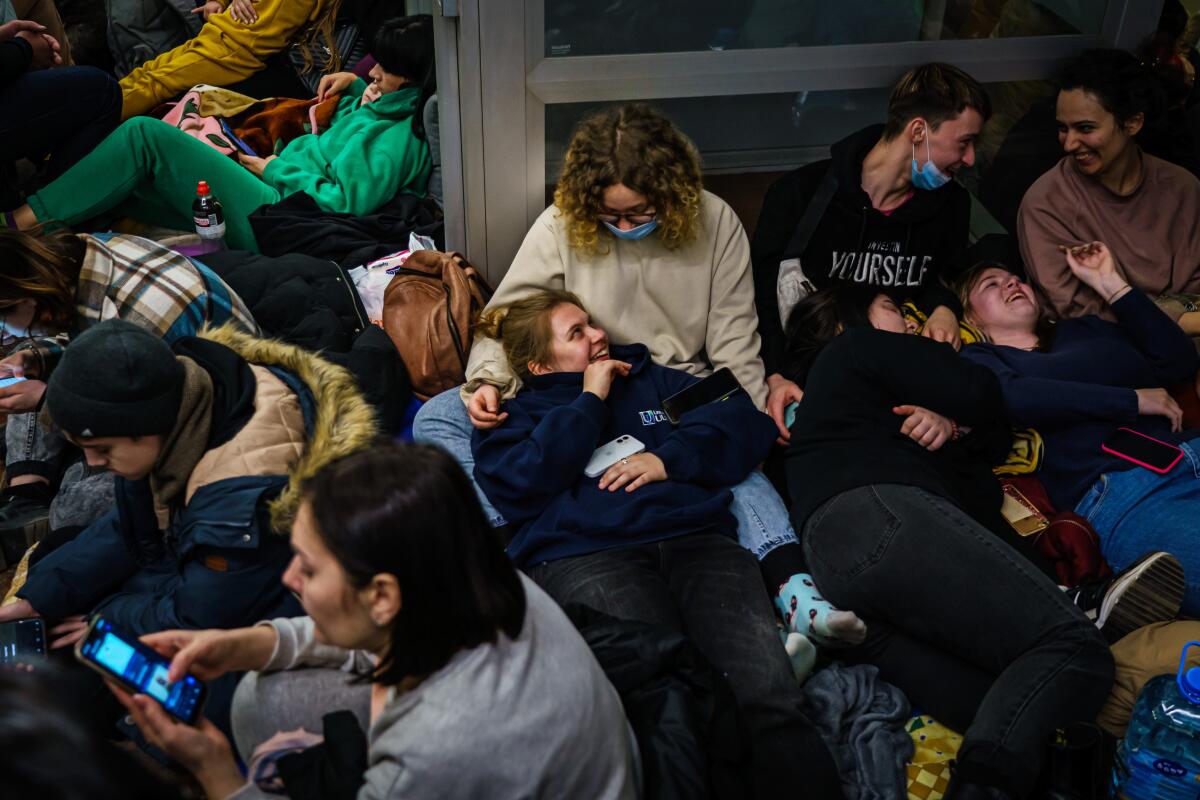
- Share via
Why is Russia attacking Ukraine? Five things you need to know
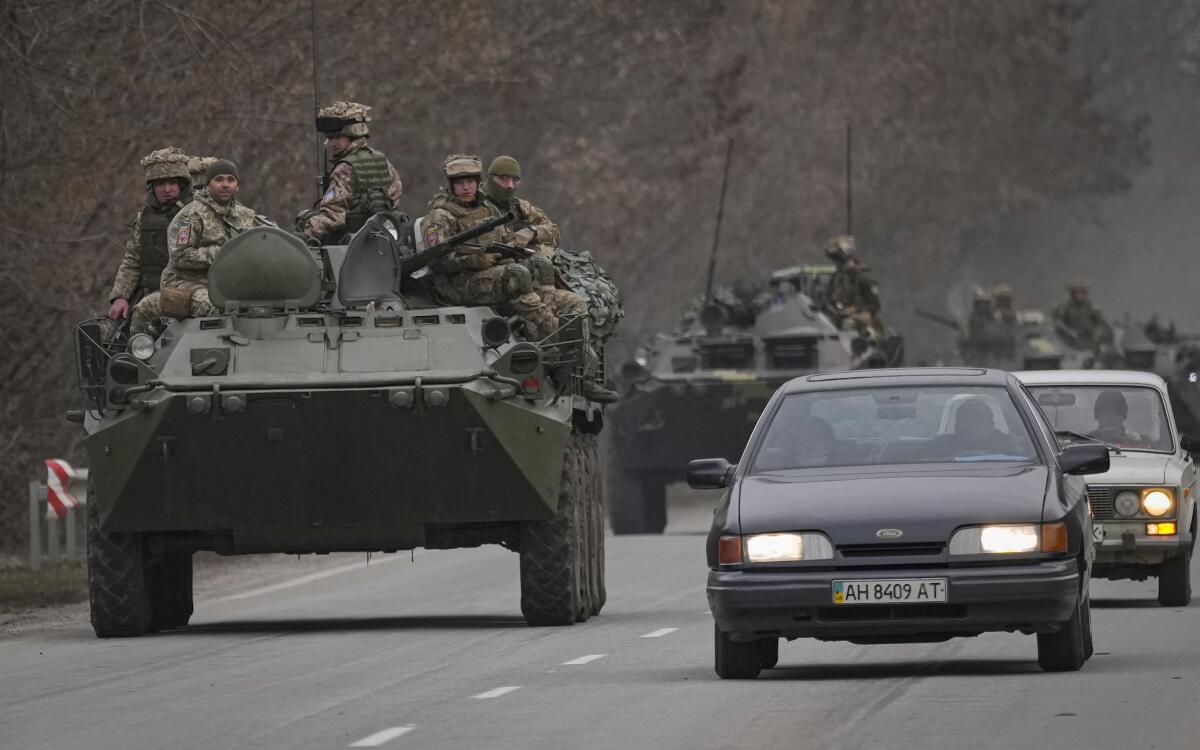
Europe is facing its greatest security crisis in decades after Russia launched a full-scale invasion of Ukraine on Thursday. The conflict is threatening to destabilize regional political and military alliances and sparking fears that U.S. troops could be drawn into the fighting.
What’s happening in Ukraine?
Russia attacked Ukraine on Thursday, including airstrikes and shelling, as civilians fled or sought shelter. Ukraine’s government said Russian tanks and troops had crossed the border from the east, north and south in a “full-scale war.” Ukrainian authorities described ground invasions in multiple regions. Border guards released footage showing Russian military vehicles crossing into Ukraine’s government-held territory. European authorities declared the country’s airspace an active conflict zone.
President Vladimir Putin proceeded with the attack despite condemnation and sanctions from the U.S. and other world powers, referring to Russia’s nuclear arsenal and threatening any country that attempts to interfere with “consequences you have never seen.”
- Share via
U.S. expels Russian diplomat but not over Ukraine
The U.S. government has expelled the No. 2 diplomat at Russia’s embassy in Washington, a retaliation for the Kremlin’s expulsion earlier this month of the second-ranking envoy in the U.S. Embassy in Moscow, the State Department said Thursday.
Russian Minister Counselor Sergey Trepelkov was told Wednesday that he had to leave the country, a senior U.S. State Department official said on condition of anonymity. The expulsion is not related to Russia’s invasion of Ukraine, the State Department said, but part of an ongoing dispute over the numbers of diplomats each country can employ in the other’s capital and how long they may remain.
The official did not discuss whether similar diplomatic steps would be taken over the invasion of Ukraine, saying a certain amount of contact between the U.S. and Russia has to be maintained. Nevertheless, the two nations are at their highest level of tension in decades.
- Share via
Beijing may be tempted to side with Putin in the Ukraine conflict. But at what cost?
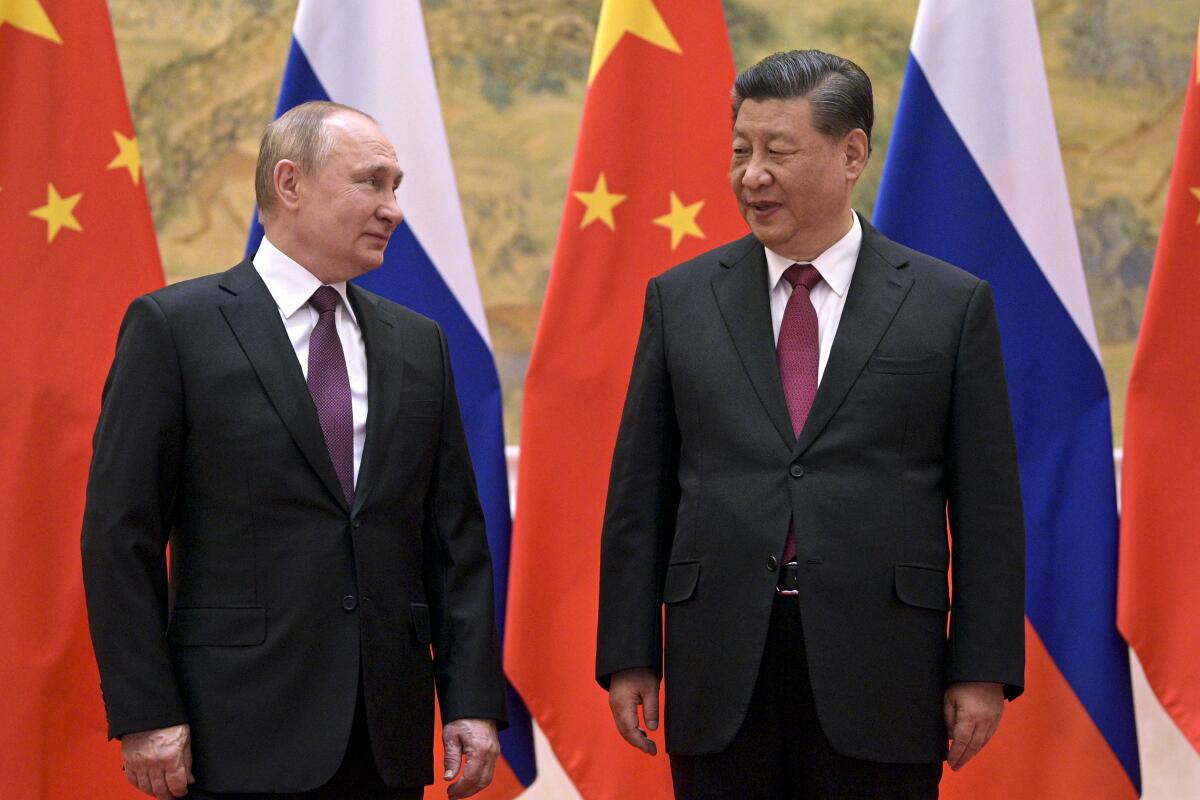
TAIPEI, Taiwan —As Russia pushes into Ukraine and President Biden marshals the global response, the elephant standing in the shadows is China.
On the surface, Russian President Vladimir Putin’s attack may seem to hand Chinese leader Xi Jinping a golden opportunity — a chance to pursue the common goal of the two U.S. rivals to damage Washington and its alliances.
But the conflict also puts Xi in an uncomfortable position that ultimately could prove consequential for his country and its relationship with the United States and American allies.
If Putin continues to use military force to re-create his dream of restoring the boundaries of the former Soviet Union, China’s dual goals of discomfiting the West and benefiting its economy may be hard to maintain.
- Share via
57 Ukrainians killed in invasion, health minister says
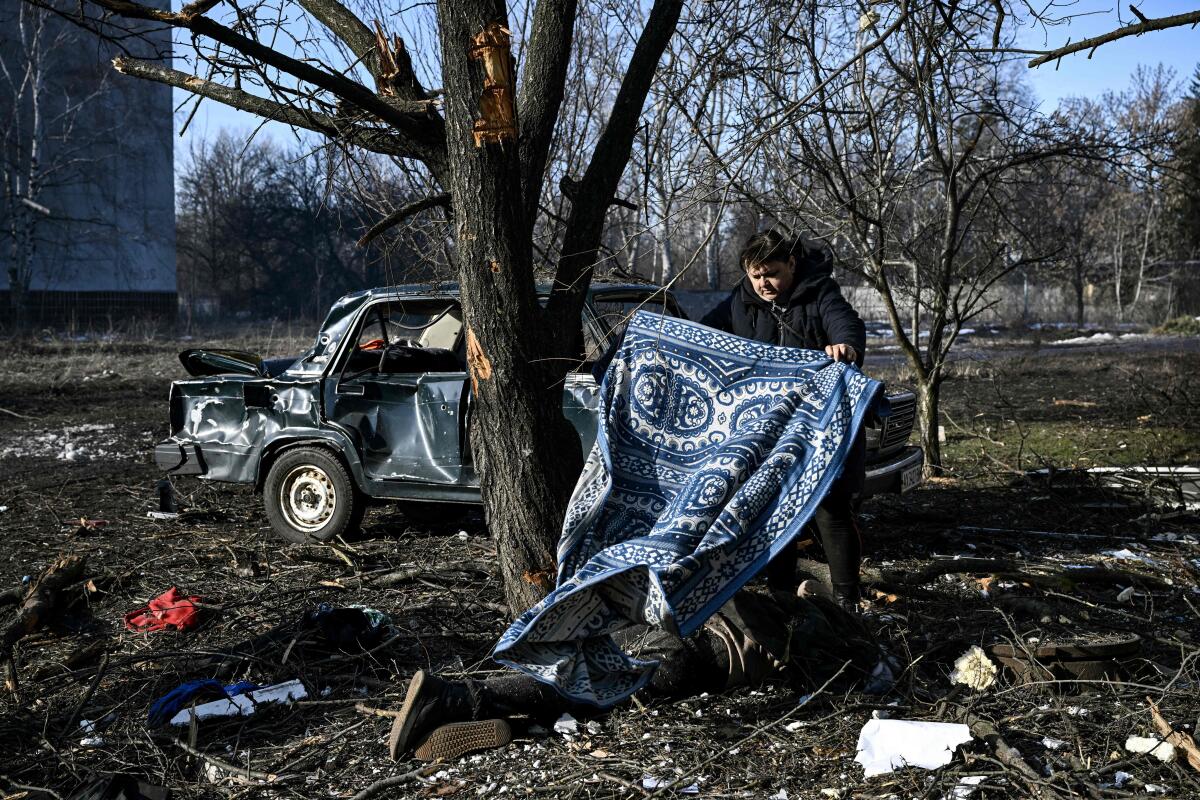
KYIV, Ukraine — Ukraine’s Health Minister Viktor Lyashko says 57 Ukrainians have been killed as a result of the Russian invasion, and 169 more were wounded.
He also said Thursday that Ukrainian authorities are repurposing the country’s healthcare facilities to make room for those who need medical assistance because of the hostilities.
- Share via
‘We’re keeping watch’: What foreign correspondents Nabih Bulos, Marcus Yam are seeing in Ukraine
KHARKIV, Ukraine —The Times’ Middle East bureau chief, Nabih Bulos, and photojournalist and foreign correspondent Marcus Yam are covering Russia’s invasion of Ukraine.
As Russian troops advance from three sides into the country, Bulos and Yam are documenting the stories of ordinary Ukrainians facing the destruction of the existence they had built after the Soviet Union’s demise.
Here’s what they’re seeing.
- Share via
- Share via
Who is Ukraine’s president? And can he handle this crisis?
KYIV, Ukraine — As Russia moves ahead with its invasion of Ukraine, world leaders and the public have turned to Ukrainian President Volodymyr Zelensky for on-the-ground information and signals of what may happen next.
The former comedy sketch artist, who won a surprising landslide victory as a political outsider in 2019, has now declared martial law in his embattled nation and is encouraging his compatriots to take up arms.
The assault on his country will test the smarts and strength of the 44-year-old president in leading it through such a perilous moment.
Here’s what we know:
- Share via
Will Russia’s attack on Ukraine push gas and food prices even higher?

Russia’s attack on Ukraine comes at a vulnerable time for economies around the world. Inflation is already at a worrisome level, consumers are paying more for basic goods across the board, and the global supply chain is still recovering from pandemic disruptions.
The invasion, which has upended geopolitics and threatens a humanitarian crisis in Ukraine, sent stocks tumbling and oil prices rising on Thursday. Here, we answer some questions on how this might continue to play out for the economy and what this means for consumers in the U.S. and California.
Will food and gas prices in the U.S. rise?
Russia and Ukraine are major producers of a range of commodities — oil, natural gas, grains, metals — whose prices rise facing big global events such as war. Those higher prices eventually ripple to local grocery stores and the gas pump, and this conflict is no different.
“It is the American middle and working classes that will bear the burden of adjustment caused by another European war,” said Joseph Brusuelas, chief economist at the accounting firm RSM.
- Share via
Why is Russia’s Vladimir Putin so obsessed with invading Ukraine?
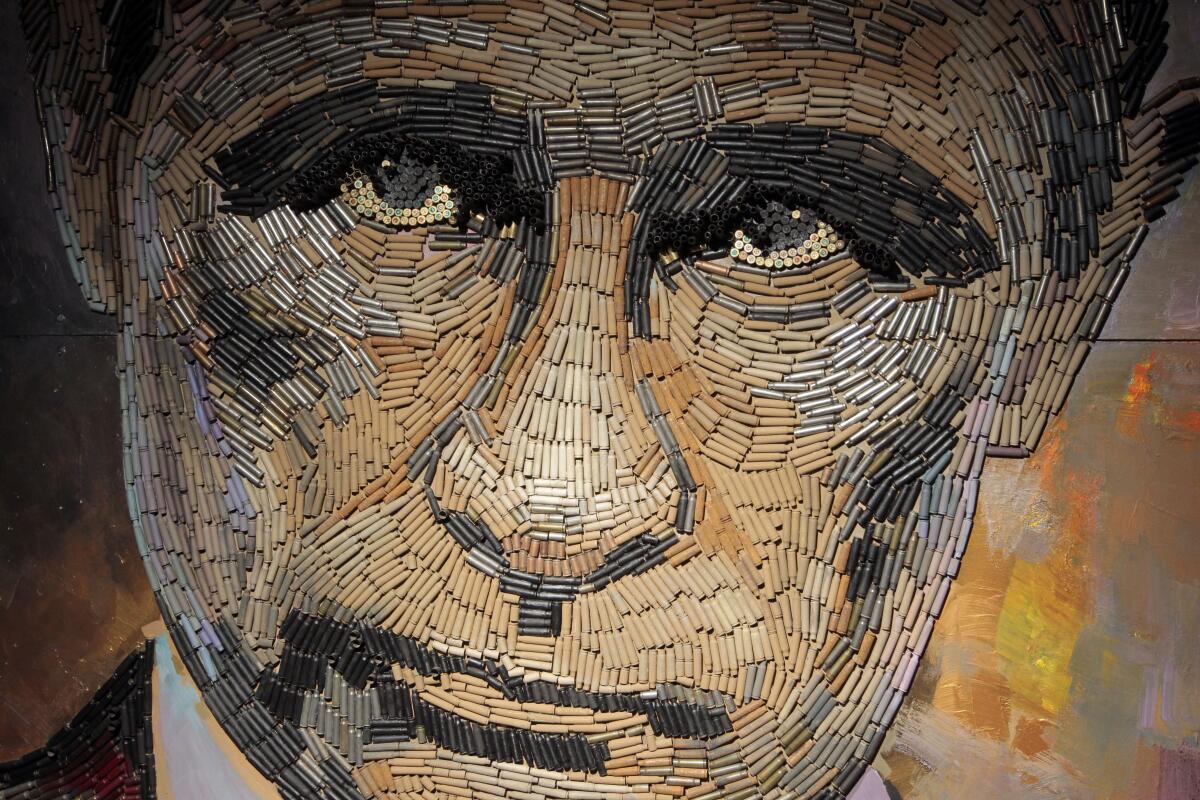
WASHINGTON —Why is Russian President Vladimir Putin so obsessed with Ukraine? That’s the question on many minds as Russia’s invasion of the former Soviet republic continues.
The answer involves a mix of history, geography, and Putin’s desire to return his country to the glory days of Soviet Union superpower.
Putin mourns the Soviet Union
A former KGB operative, Putin has said the collapse of the Soviet Union was one of the greatest disasters of modern history. He says he does not regard the former Soviet republic of Ukraine as a real country, nor Ukrainians as separate people.
In what historians took as an extreme attack on history, Putin said in a rambling speech Monday: “Modern Ukraine was entirely and fully created by Russia.”
The Ukrainian people voted overwhelmingly in 1991, in a democratic referendum, to leave the Soviet Union and become independent.
Much of the West, probably unwittingly, bought into part of the narrative by referring to Ukraine as “the Ukraine,” the way Putin and Russian nationalists do. It’s similar to how Americans refer to “the South” or “the Midwest,” parts of the U.S., not separate countries.
- Share via
U.S. sanctions target banks, Russian financiers and major industries
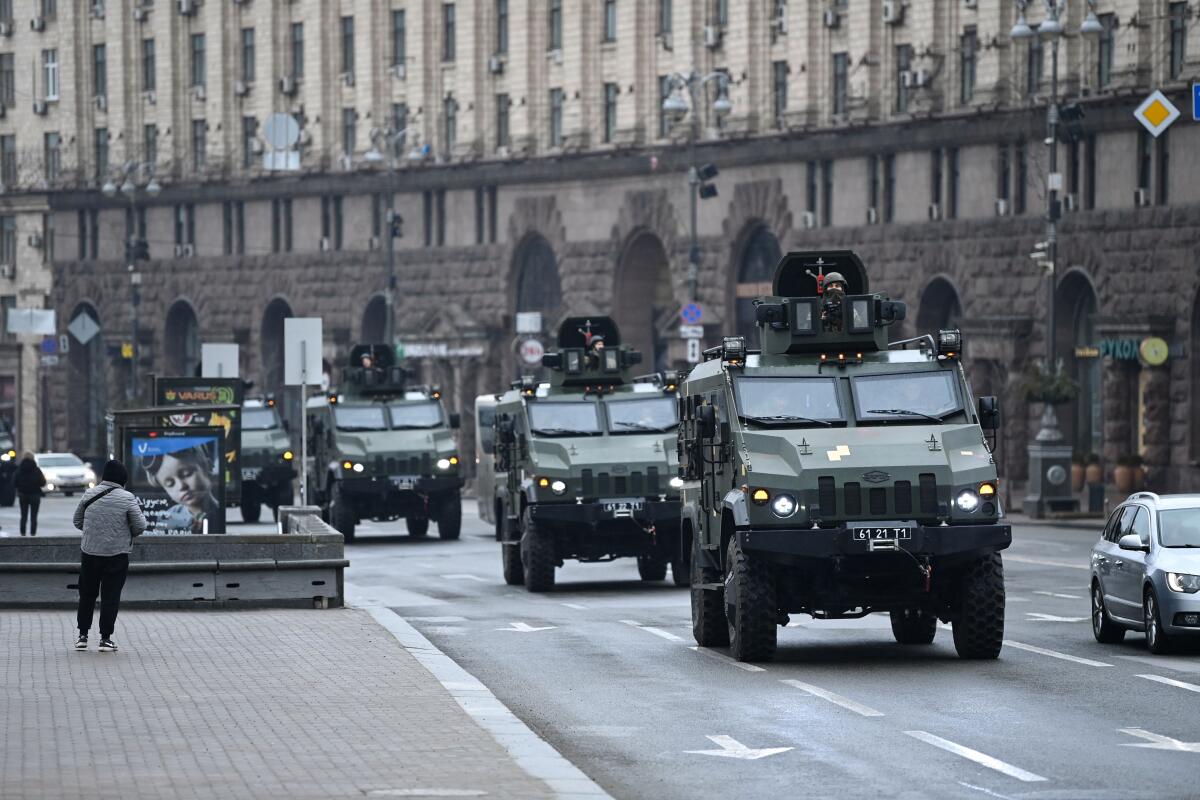
The sanctions imposed against Russia on Thursday are aimed at the core of the nation’s financial system, including all of its largest financial institutions. The sanctions include:
- Severing Russia’s largest financial institution, Sberbank, from the U.S. financial system.
- Freezing the assets of Russia’s second largest financial institution, VTB Bank, and three other major Russian banks in the U.S.
- Blocking several other Russian banks and companies, including the world’s largest natural gas company, from working with U.S. banks or creditors.
- Restricting the sales of U.S.-made technologies to Russia. Those prohibitions include the exporting to Russia of semiconductors, telecommunication, encryption security, lasers, sensors, navigation, avionics and maritime technologies and certain military equipment.
- Freezing the U.S. accounts and assets of several Putin allies.
- Share via
U.S. military to send some 7,000 service members to Europe
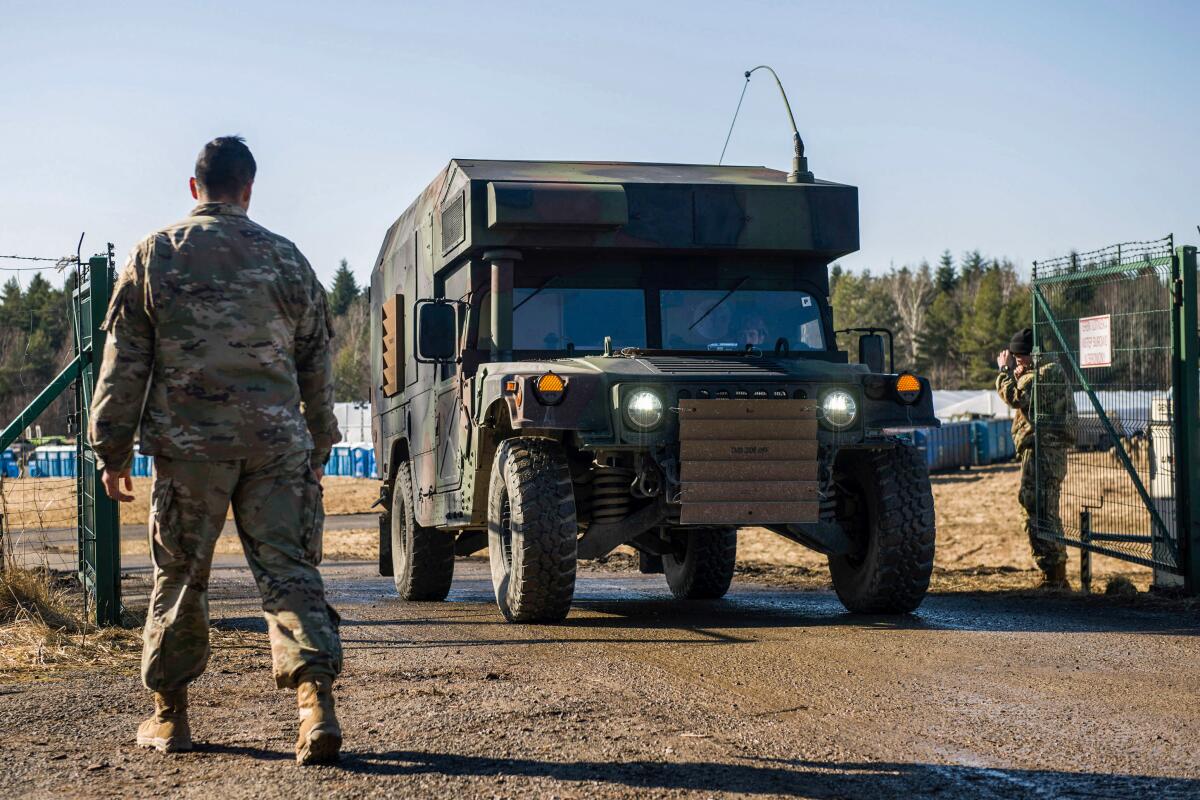
At the direction of President Biden, Secretary of Defense Lloyd J. Austin III has ordered the deployment to Europe of approximately 7,000 additional service members.
This would comprise an armored brigade combat team with associated capabilities and enablers. They will deploy to Germany to reassure NATO allies, deter Russian aggression and be prepared to support a range of requirements in the region. They are expected to depart in the coming days, according to the Pentagon.
Biden on Tuesday authorized more U.S. troops to support eastern NATO members Estonia, Latvia and Lithuania, asserting the move was defensive and was meant to “abide by the commitments we made to NATO.”
The new deployments will join about 90,000 U.S. troops already stationed in Europe.
- Share via
Biden says U.S. will impose tough sanctions on ‘Putin’s war’
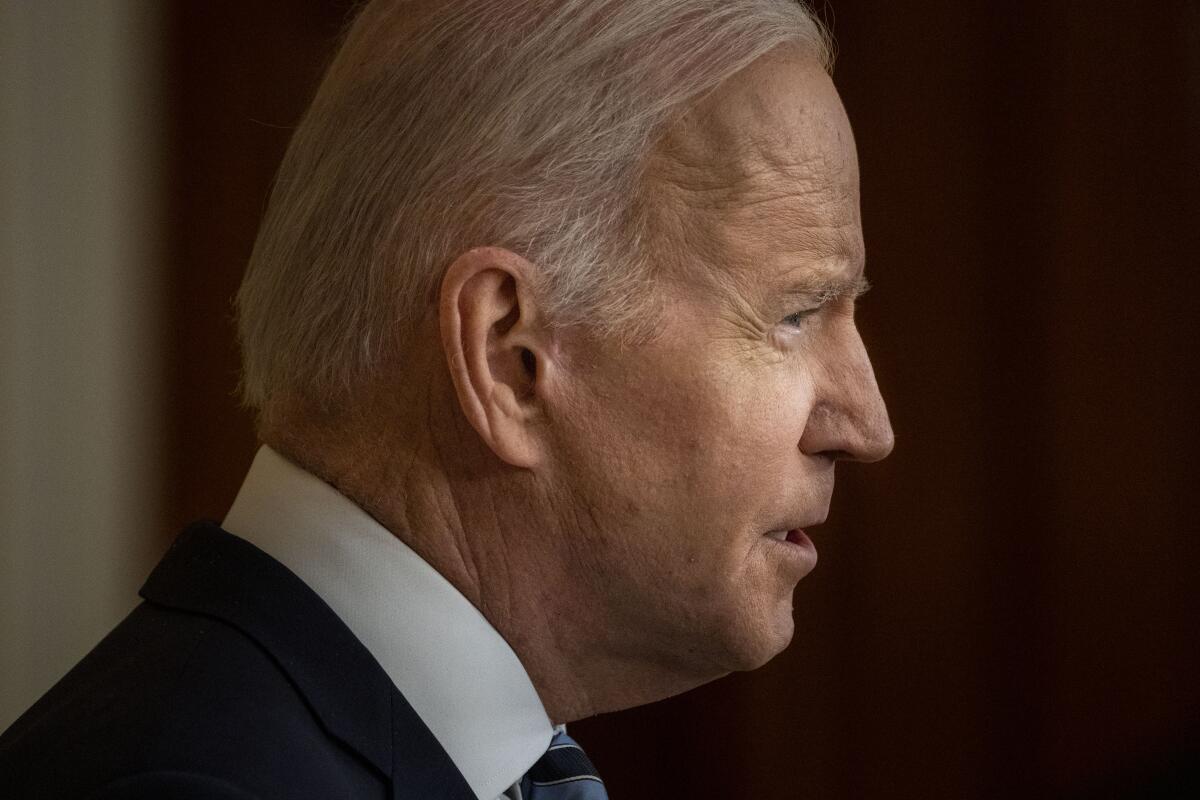
President Biden on Thursday called the Russian invasion of Ukraine a war “without provocation, without justification, without necessity” and said he was imposing severe sanctions on Moscow for its “premeditated attack.”
Biden said the new sanctions would be extensive and “limit the ability of Russia to do business in dollars, euros, pounds and yen.”
“We are going to stunt the ability of [Moscow] to finance and grow the Russian military,” Biden said, calling the invasion “Putin’s war.”
He added that the U.S. would be imposing sanctions at Russian banks and the nation’s largest state-owned enterprises. “America stands up to bullies,” he said.
In response to a question by a reporter, Biden said the U.S. was not going to block Russia from using a key global financial messaging network, saying that he believed that U.S. measures may be just as consequential.
He added that “it’s always an option, but it’s not a position the rest of Europe wants to take.”
- Share via
U.N. frees funds for humanitarian aid in Ukraine
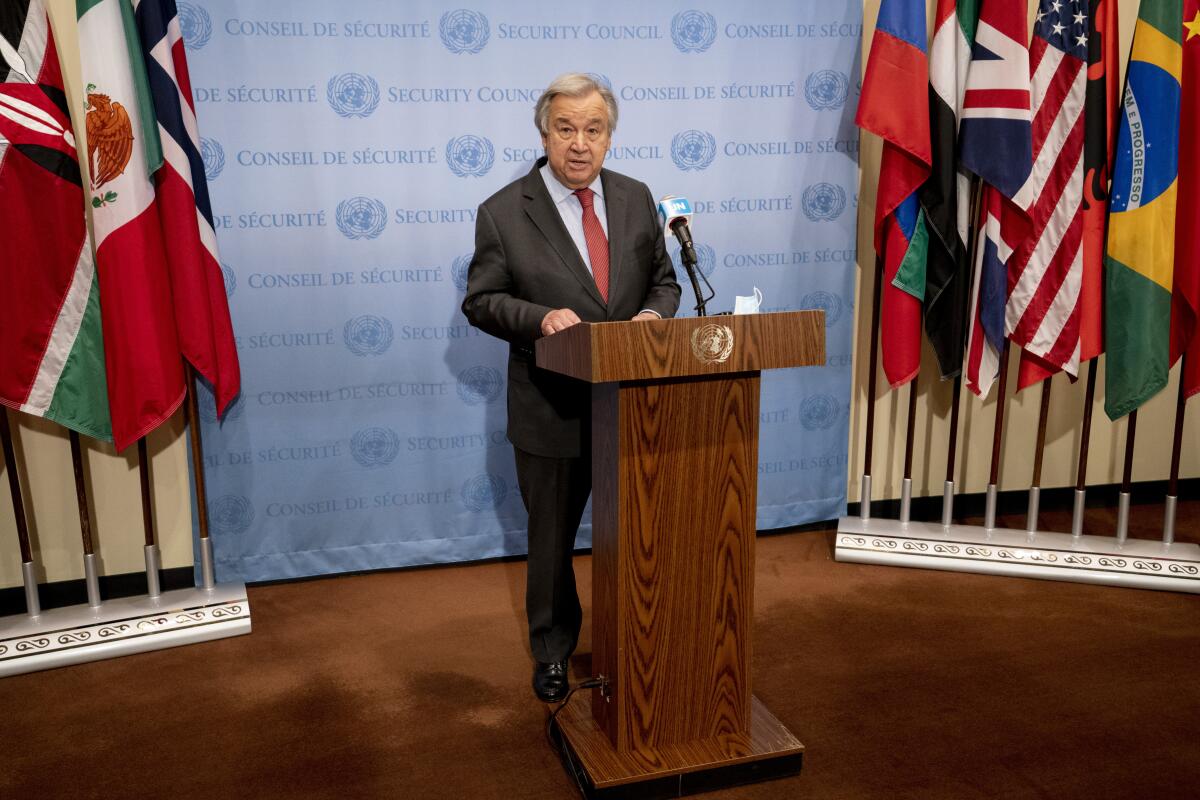
Repeating a plea for Russia to halt its invasion of Ukraine, the U.N. chief said Thursday that the world body was freeing up $20 million for urgent humanitarian needs in the country.
“Stop the military operation. Bring the troops back to Russia,” Secretary-General Antonio Guterres said at U.N. headquarters in New York. He called the offensive wrong and unacceptable but not irreversible.
“It’s not too late to save this generation from the scourge of war,” Guterres said.
Russian President Vladimir Putin has said the assault is meant to protect civilians in eastern Ukraine, where pro-Russian separatists have been fighting the government for nearly eight years. The U.S., however, said ahead of time that Russia would try to justify an invasion by falsely claiming that the rebel-held areas were under attack.
The U.N. said Thursday it was relocating some of its roughly 1,500 staffers in Ukraine. However, Guterres reiterated that the U.N. will continue providing aid to people in the country, “regardless of who or where they are.”
- Share via
Ukrainian refugees arrive in Poland
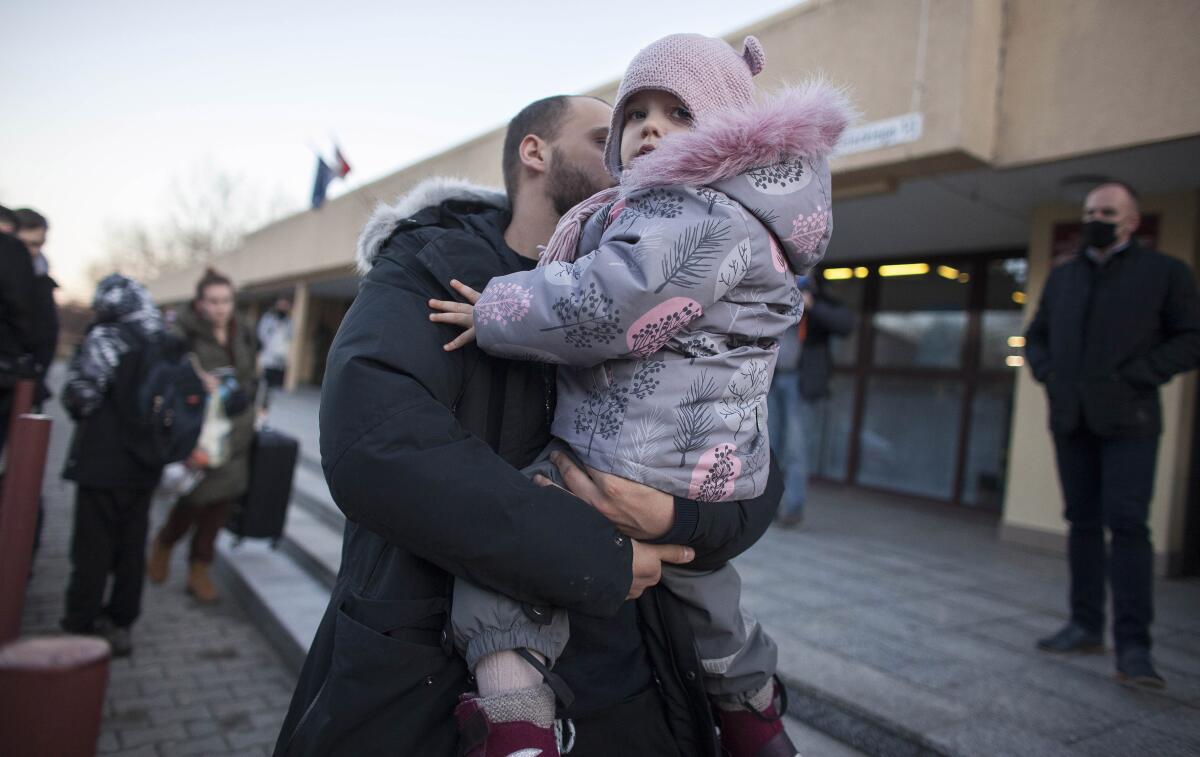
WARSAW — Some of the first refugees from Ukraine have arrived in European Union member Poland by road and rail.
A scheduled train from Kharkiv in eastern Ukraine arrived Thursday afternoon in the Polish town of Przemysl, near Ukraine’s western border, carrying a few hundred passengers.
The passengers of various ages, arriving with bags and backpacks, told the Associated Press they were fleeing war. Some live in Poland and were returning urgently from visits to their homeland.
The chief of Poland’s border guards, Gen. Tomasz Praga, said there was a visible increase in the number of people wanting to cross into Poland.
Officials said Poland has prepared at least eight centers with food, medical care and places to rest.
Polish Prime Minister Mateusz Morawiecki said that “innocent people are being killed” in Ukraine and appealed to Poles to extend every possible assistance to the Ukrainians who have found themselves in need of help.
- Share via
Map: Tracking the invasion of Ukraine
Russian troops crossed into Ukraine early Thursday morning.
- Share via
Russian military takes Chernobyl nuclear site, official says
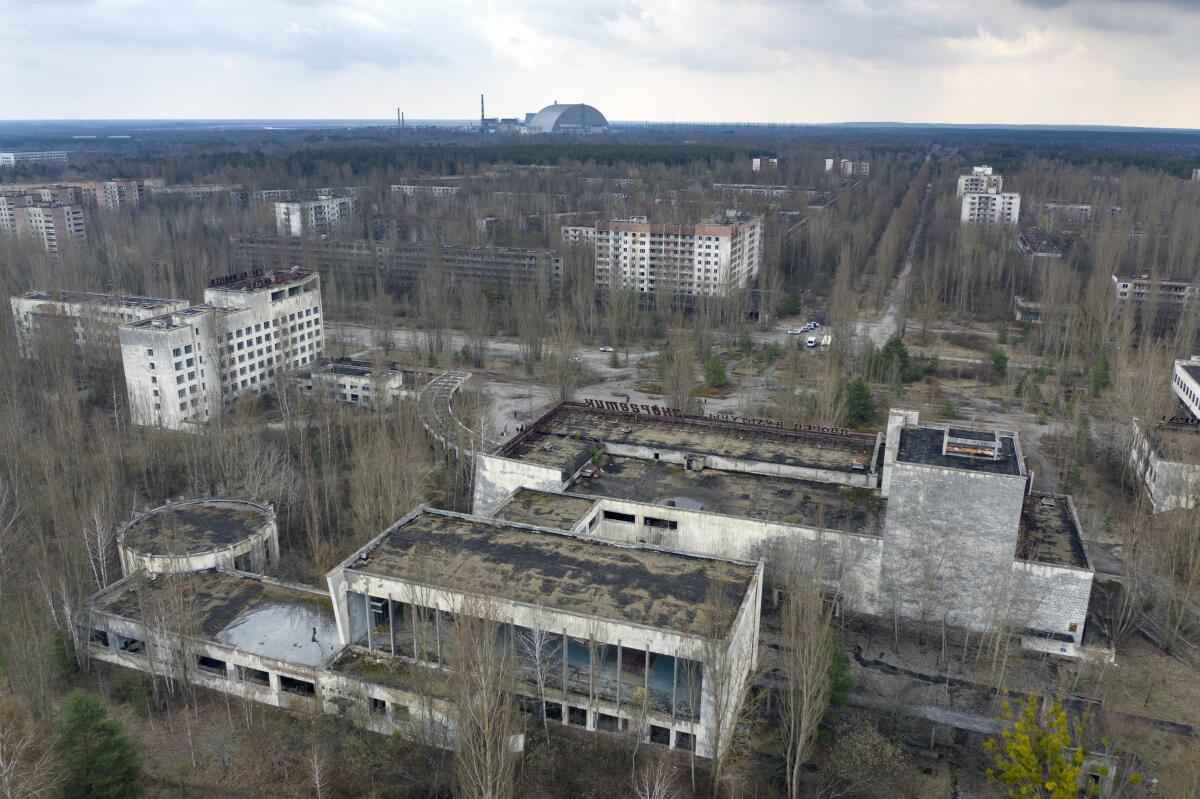
KYIV, Ukraine—A presidential adviser says Ukraine lost control of the Chernobyl nuclear site, where Ukranian forces had waged a fierce battle with Russian troops.
Adviser Myhailo Podolyak told The Associated Press that Ukrainian authorities did not know the current condition of the facilities at Chernobyl, the site of the world’s worst nuclear disaster.
“After the absolutely senseless attack of the Russians in this direction, it is impossible to say that the Chernobyl nuclear power plant is safe,” he said.
Ukrainian President Volodymyr Zelenskyy had announced several hours earlier Thursday that Russian forces were trying to seize the Chernobyl nuclear plant.
A nuclear reactor at the plant 130 kilometers (80 miles) north of Ukraine’s capital, Kyiv, exploded in April 1986, sending a radioactive cloud across Europe.
The exploded reactor was covered by a protective shelter several years ago to prevent radiation leaks.
A Ukrainian official said Russian shelling hit a radioactive waste repository and an increase in radiation levels was reported. The official spoke on condition of anonymity to discuss the sensitive matter.
It was not immediately possible for experts to access the repository to assess damage before Russian forces overtook the site.
- Share via
Watch live: Biden expected to announce new sanctions on Russia

- Share via
Source: U.S., allies won’t bar Russia from global banking system
The U.S. and its allies will not bar Russia from the SWIFT international banking network, according to a source familiar with the package of economic sanctions and other measures President Biden is set to announce Thursday afternoon.
Although several Democrats and Republicans have urged the administration to take that step, which would block nearly all international banking by Russia, the White House and numerous European allies aren’t ready to go that far.
They are concerned that such a step might further drive up energy prices and harm the broader economy, especially in countries like Germany, the source said.
- Share via
Ukrainian ambassador cites Chernobyl attack, says Russian platoon surrendered because they didn’t sign up to ‘kill Ukrainians’
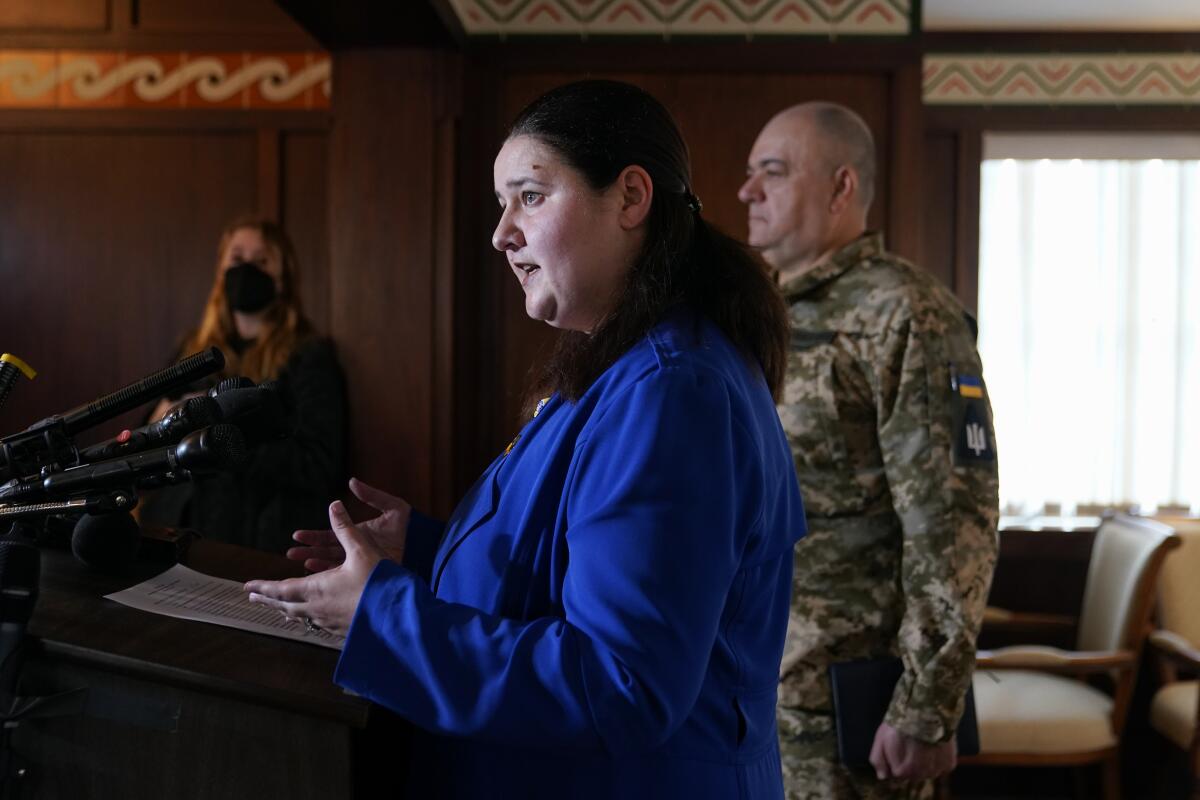
WASHINGTON — Ukraine’s ambassador to the United States, Oksana Markarova, gave a sobering account Thursday of the warfare consuming her country, including a death toll of about 40 Ukrainian troops and “dozens” of civilians. She said Russian forces are trying to take over the Chernobyl nuclear plant, site of the world’s worst nuclear disaster.
Speaking to reporters in Washington, she did not provide details, nor could the Chernobyl attack be independently verified. President Volodymyr Zelensky, in Kyiv, made the same assertion.
The 1986 explosion at Chernobyl, about 80 miles north of Kyiv, sent radioactive waste across Europe. The plant has been decommissioned and the damaged reactor covered to prevent leaks.
Markarova raised the specter of another disaster as a result of the fighting or Russian tampering.
In addition to Ukraine’s casualties, Markarova said Ukrainian forces shot down two Russian helicopters and seven other aircraft.
An entire Russian platoon surrendered, Markarova said, citing Ukrainian military commanders. The soldiers, she said, told their captors they didn’t realize they had been dispatched on a mission to “kill Ukrainians.”
- Share via
Russia has military advantage, but Ukrainians determined to fight, Adam Schiff says
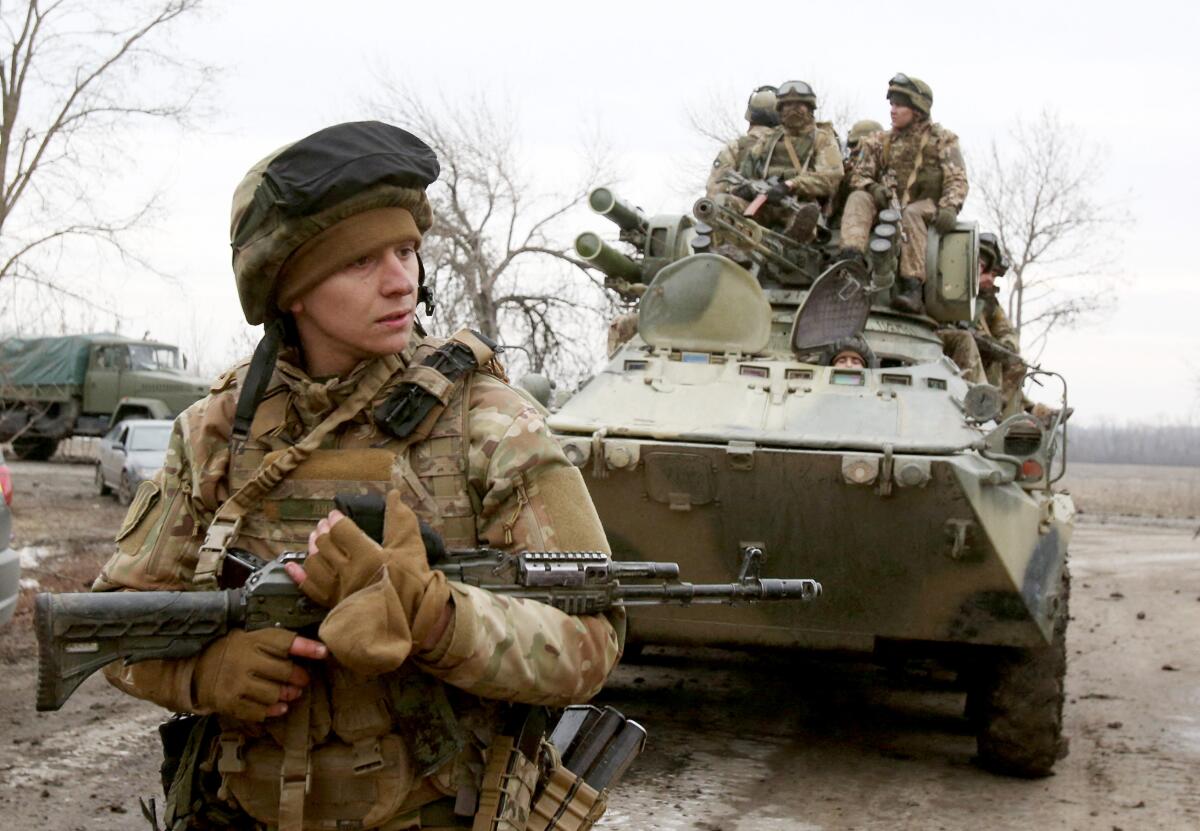
House Intelligence Committee Chairman Adam Schiff (D-Burbank) said the U.S. and its allies need to be united in imposing “the most severe sanction regime against Russia that the allies have ever put together.”
Comparing Ukrainian and Russian military capabilities, the Californian told reporters on Capitol Hill that it’s “hard for us to evaluate the success or the difficulty that Ukrainian armed forces are running into, but it’s a terrible mismatch.”
“The Russians, I think, have the military capability to overwhelm Ukrainian forces, but Ukrainians are determined to fight and to protect their homeland,” Schiff said. “While I think we are likely to see Russia very quickly overrun Ukraine, I also think that this will be a long and bloody campaign — a pointless, needless, disastrous campaign — and that may take months and it may take years. And all along the way, we need to have Ukraine’s back.”
Schiff also warned of the possibility that Russia’s cyberattacks could extend beyond Ukraine.
“The other possibility is that Putin lashes out at the United States and NATO and that in this kind of hybrid warfare, it deploys cyber tools to attack American companies or American infrastructure,” he said. “We have to hope and pray that doesn’t happen, but in warfare there’s always the risk of escalation.”
- Share via
Russian troops take airport in 15 minutes from Ukraine’s capital
Russian troops have occupied Antonov International Airport in Hostomel, according to Ukraine’s Interior Ministry. The airport is just a 15-minute drive from Kyiv, the Ukrainian capital.
Duke University professor Simon Miles, an expert on the cold war, told reporters earlier Thursday that it was notable that Antonov was the only Ukrainian military airfield not destroyed overnight. It would be strategically important for a ground invasion, he said.
“They are preparing for a much larger airborne insertion,” he said.
Miles said taking the airport near Kyiv is similar to a maneuver executed by Russian troops last month in quelling protests in Kazakhstan. Holding the airport gives Russia a location near the capitol from which to launch a ground invasion, limiting Ukraine’s ability to repel it, he said.
“I think that there are going to be major military moves still today and, if necessary, tomorrow,” he said, “but my sense is that the way the Russian military is fighting this, they are fighting to go for value, if you will, to strike at the Ukrainian center of gravity that is their capital and try to wrap this up as quickly as possible.”
- Share via
U.N. Security Council to take up resolution condemning Russia
A senior U.S. official says the U.N. Security Council is expected to vote Friday on a resolution condemning Russia’s attack on Ukraine in the strongest terms possible and demanding the immediate withdrawal of all its forces — knowing that Russia will veto the legally binding measure.
The United States believes it is important to put the resolution to a vote to underscore Russia’s international isolation, and emphasizes that the veto will be followed quickly by a resolution in the 193-member U.N. General Assembly where there are no vetoes, the official said Thursday. He spoke on condition of anonymity because he was not authorized to speak publicly.
“This is a first step in how the U.N. responds to this premeditated war of choice that Russia has chosen to take, and we will see action in the General Assembly in the coming days,” he said, adding that it is part of a much broader, coordinated response that includes steps the Biden administration and its allies are taking.
The resolution is drafted under Article 7 of the U.N. Charter, which can be enforced militarily, according to the official.
- Share via
Russia-Ukraine conflict raises big risks for global economy
WASHINGTON —Just what a vulnerable world economy didn’t need — a conflict that accelerates inflation, rattles markets and portends trouble for everyone from European consumers to indebted Chinese developers and families in Africa that face soaring food prices.
Russia’s attack on Ukraine and retaliatory sanctions from the West may not portend another global recession. The two countries together account for less than 2% of the world’s gross domestic product. And many regional economies remain in solid shape, having rebounded swiftly from the pandemic recession.
Yet the conflict threatens to inflict severe economic damage on some countries and industries — damage that could mean hardships for millions of people.
Russia is the world’s third-biggest producer of petroleum and is a major exporter of natural gas. Ukraine’s farms feed millions around the world. And financial markets are in a precarious spot as central banks prepare to reverse years of easy-money policies and raise interest rates to fight a resurgence of inflation. Those higher rates will likely slow spending and raise the risk of another downturn.
- Share via
Stocks tumble; oil, wheat prices soar after Russian attack on Ukraine
NEW YORK —Stocks tumbled worldwide on Thursday after Russia’s attack on Ukraine sent fear coursing through markets and upped the pressure on the high inflation already squeezing the global economy.
On Wall Street, the Standard & Poor’s 500 sank 1.6% in early trading to continue its dismal start of the year. The benchmark index is now down 13.5% from its record set early this year. Stocks in Europe sank even more after the chief of the NATO alliance called Russia’s moves a “brutal act of war,” with the German DAX down nearly 5%.
Beyond its human toll, the conflict looks set to send prices spiraling even higher at gasoline pumps and grocery stores around the world. Russia and Ukraine are major producers not only of energy products but also grains and various other commodities. War could upend global supplies, as could sanctions imposed by the United States and other allies.
Oil prices on both sides of the Atlantic jumped toward or above $100 per barrel to their highest levels since 2014, up more than 6%. Wholesale prices also shot up for heating oil, wheat and other commodities. The spot price in Europe for natural gas, for which the continent relies on Russia to supply, jumped as much as 31%.
- Share via
Russian invasion violates international law, NATO secretary-general says
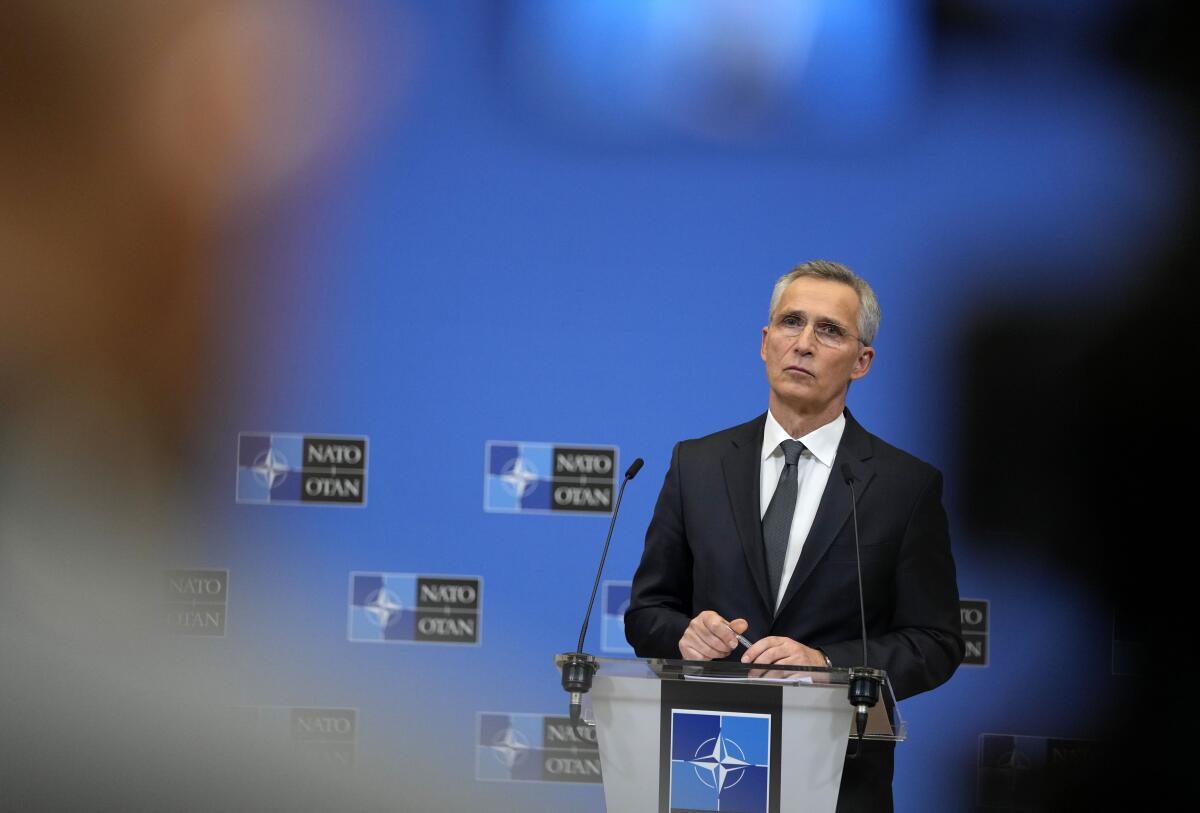
On Thursday, NATO Secretary-General Jens Stoltenberg described the incursion in Ukraine as “a deliberate, cold-blooded and long-planned invasion” and a “blatant violation of international law.”
“We now have war in Europe on a scale and of a type we thought belonged to history,” said Stoltenberg, who will convene an emergency virtual summit of NATO leaders Friday. “This is a grave moment for the security of Europe.”
“Russia’s unjustified and unprovoked attack on Ukraine is putting countless innocent lives at risk with air and missile attacks, ground forces and special forces from multiple directions, targeting military infrastructure and major urban centers,” Stoltenberg said.
- Share via
Ukrainians rush to metro stations, which double as bomb shelters
This is the view of Kharkiv, the second-largest city in Ukraine after Russia invaded the country.
L.A. Times foreign correspondent Nabih Bulos shows empty streets during what should be rush hour and anxious residents crowding into the metro station, which doubles as a bomb shelter.
- Share via
Pentagon believes Russia intends to install own government in Ukraine, senior official says
The Pentagon believes Russia intends to “decapitate” the government of Ukraine and install its own, a senior Defense official told reporters Thursday.
The official, who asked to remain anonymous, said that all signs are that the moves so far are an “initial phase” and most Russian troops near the borders have not yet entered Ukraine. Last night’s explosions and airstrikes are part of three primary lines of assault directed toward Ukraine’s capital, Kyiv, the official said.
The bulk of fighting is in Kharkiv, the country’s second largest city, located in the south, and Russian troops also have entered from Belarus in the north, the official said, but there is no sign of amphibious assault from the Black Sea in the south.
Russia’s three lines of attack include a southern advance, from the Crimea peninsula, stretching to the north to the city of Kherson. Another assault extends from north-central Ukraine to the south, “basically from Belarus to Kyiv.” The third is from northeast Ukraine to the south, approximately from Belarus to Kharkiv.
“These three axes are what we believe are clearly designed to take key population centers,” the official said, adding that the heaviest fighting is in and around Kharkiv right now.
Attacks began at 9:30 p.m. Eastern time Wednesday, with more than 100 Russian-launched missiles raining down on key cities in central and eastern Ukraine, the official stated. Russia began ground invasions in Belarus at 5 a.m. Eastern.
Public means of communication and media in Ukraine remain intact as of now, the official stated, warning that the “full scope” of Russia’s cyberattack capabilities has yet to be seen and may still be used. Russia thus far has targeted Ukraine’s military and air defense, including barracks, ammunition warehouses and nearly 10 airfields.
There is no estimate yet on the number of casualties or the amount of total damage, the official said.
- Share via
What is SWIFT and what happens if Russia is cut off from it?
For the U.S. and its European allies, cutting Russia out of the SWIFT financial system, which shuffles money from bank to bank around the globe, would be one of the toughest financial steps they could take, damaging Russia’s economy immediately and in the long term. The move could cut Russia off from most international financial transactions, including international profits from oil and gas production, an industry that accounts for more than 40% of the country’s revenue.
Allies on both sides of the Atlantic also considered the SWIFT option in 2014, when Russia invaded and annexed Ukraine’s Crimea and backed separatist forces in eastern Ukraine. Russia declared then that kicking it out of SWIFT would be equivalent to a declaration of war. The allies — criticized ever after for responding too weakly to Russia’s 2014 aggression — shelved the idea.
Russia since then has tried to develop its own financial transfer system, with limited success.
The U.S. has succeeded before in persuading the SWIFT system to kick out a country: Iran, over its nuclear program.
But booting Russia from SWIFT would also hurt other economies, including those of the U.S. and key ally Germany.
Annalena Baerbock, the foreign minister for Germany, seemed to express doubts.“The toughest stick won’t always ultimately be the most intelligent sword,” Baerbock said.
- Share via
House Minority Leader Kevin McCarthy decries Russia’s invasion
House Minority Leader Kevin McCarthy (R-Bakersfield) in a statement called Russian President Vladimir Putin’s invasion of Ukraine an “act of war” that is “intended to rewrite history and more concerning, upend the balance of power in Europe.”
“Putin’s actions must be met with serious consequence,” McCarthy said. “The United States stands with the people of Ukraine and prays for their safety and resolve.”
Many Republicans, including McCarthy, have not attacked President Biden in their statements, a nod to the idea of presenting a united front even in a partisan environment.
But some supporters of former President Trump have, including the third ranking House Republican, Elise Stefanik of New York, who decried Biden as a “weak, feckless and unfit president.”
- Share via
Ukraine says Russia is trying to seize Chernobyl
Ukrainian President Volodymyr Zelensky says Russian forces are trying to seize the Chernobyl nuclear plant.
The plant was the site of the world’s worst nuclear accident when a reactor exploded in April 1986, spewing radioactive waste across Europe. The plant lies 80 miles north of the capital of Kyiv.
The exploded reactor has been covered by a protective shelter to prevent radiation leak, and the entire plant has been decommissioned.
Zelensky said on Twitter: “Our defenders are giving their lives so that the tragedy of 1986 will not be repeated.” He added, “This is a declaration of war against the whole of Europe.”
- Share via
The European Union prepares for influx of Ukrainian refugees
LONDON — While watching with horror an attack on a democratic country in its own backyard, the rest of Europe is bracing for a possible wave of Ukrainian refugees fleeing west for safety.
The European Union says it is prepared for that eventuality — mindful of the 2015 migrant crisis that saw 1 million newcomers, many of them escaping war in Syria, arrive on European shores.
That crush of migrants led to bitter divisions within the 27-nation bloc. “We have, with all the front-line member states, now explicit contingency plans to welcome and host immediately those refugees from Ukraine” who start arriving, Ursula von der Leyen, the president of the European Commission, said Thursday. She expressed hope that there would be no vast exodus from Ukraine, a nation of 44 million people. But for those who do seek haven within the EU, “we are fully prepared for them, and they are welcome.”
- Share via
Lawmakers call for stiff Russian sanctions even as Senate failed last week to agree on plan
Although Democratic and Republican lawmakers are calling for stiff sanctions to be levied against Russia, the Senate failed last week to agree on a sanctions package, leaving it to President Biden to decide on the scope of such measures.
The Senate effort stalled when lawmakers could not agree on whether to impose secondary sanctions on entities already the subject of such economic penalties, and whether Moscow should be allowed to continue using an international banking system.
A ban from the SWIFT banking system, a high-security communications platform used by more than 11,000 financial institutions around the world to send secure messages and payment orders, could do serious damage to the Russian economy.
Members of both chambers are expected to receive unclassified briefings by phone from the administration this afternoon.
Rep. Elissa Slotkin (D-Mich.), a former acting assistant secretary of Defense and CIA analyst, said overnight that the House and Senate national security committees should return to Washington to reach an agreement on sanctions before Biden’s State of the Union address on Tuesday.
“Congress has a role in the coming days: we need to finalize a package of sanctions, grease the skids for more military aid to Ukraine and make clear that, despite our differences, reasonable Democrats & Republicans are united in condemning Russia’s unwarranted aggression,” Slotkin said in a tweet.
- Share via
Ukrainian foreign minister pleads for help from diaspora communities
Ukrainian Foreign Minister Dmytro Kuleba early Thursday issued a call to the Ukrainian diaspora, vowing defiance and pleading for help.
“To Ukrainian communities around the world,” he said on Twitter. “Putin has attacked, but no one is running away. The army, diplomats, everyone is working. Ukraine is fighting. Ukraine will defend itself. Ukraine will win. Spread the truth about Putin’s invasion of their countries and call on governments to take immediate action.”
- Share via
Biden meets with National Security Council
President Biden gathered with his National Security Council on Thursday morning in the Situation Room to discuss the latest developments in Ukraine, according to the White House. The meeting came ahead of a scheduled virtual meeting of the G-7 world leaders (the U.S., Canada, France, Germany, Italy, Japan and the United Kingdom) that began shortly after 9 a.m. EST, during which Biden was to address the crisis.
- Share via
Biden is expected on Thursday to announce stiffer sanctions on Russia
President Biden is expected on Thursday to announce the U.S. will impose severe economic sanctions on Russia over what he described as an “unprovoked and unjustified attack” on Ukraine.
In a statement issued just after midnight, Biden did not detail what those “severe” measures would entail but said he was hoping to “rally international condemnation” of the attack. The White House in recent days has ordered sanctions that officials said would target Russian financial institutions and the country’s elites and their family members, including the head of Russia’s Federal Security Service.
- Share via
How Congress is reacting to Russia’s invasion of Ukraine
Decrying Russia’s attack on Ukraine, U.S. lawmakers in a rare show of bipartisan unity urged the Biden administration to impose tougher sanctions on Moscow in the hope of persuading it to halt its invasion. President Biden is expected to announce a tougher tranche of sanctions Thursday afternoon.
- Share via
Russia widens its attack on Ukraine: ‘We now have war in Europe’
Russia pressed ahead with its assault on neighboring Ukraine on Thursday, with explosions resounding in cities across the country, airstrikes crippling its defenses and reports of troops crossing the border by land and sea.
Huge traffic snarls formed in Kyiv as residents tried to flee the Ukrainian capital. Video showed Russian armored vehicles advancing into mainland Ukraine from Crimea, the peninsula that Moscow illegally seized eight years ago. Ukrainian air-traffic controllers sealed off the country’s airspace “due to the high risk of aviation safety for civil aviation.”
President Volodymyr Zelensky declared martial law in his embattled nation and encouraged his compatriots to take up arms. Meanwhile, the U.S. and the West prepared to impose punishing sanctions on Russia for an invasion that they had warned for weeks was coming but that Moscow had denied was planned.

